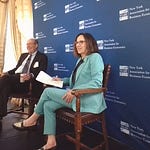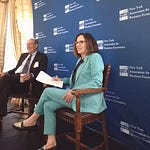Tom Hoenig served as President of the Federal Reserve Bank of Kansas City for 20 years, from 1991 to 2011, so he’s a policy maker who’s gone through many cycles, from years when the Fed had to raise rates to bring down inflation to times when it had to cut rates to ward off recession or revive growth when one started.
Now, as the Fed’s policy making Federal Open Market Committee follows through on widespread signals it sent that it would cut its key rate again at its final meeting of 2024 even as its key inflation measures recently stopped falling and started moving higher again, Tom is worried. The Fed is citing what it sees as a “cooling” labor market with unemployment at 4.2% which he says is still “full employment by most definitions.”
The risk now in his view is not that the Fed fails to cut rates enough to keep the economy moving ahead as 2025 gets underway, but that it is doing too much and may be in the unenviable position of needing to hike rates when it may be under pressure from the new administration to cut them.
Why is Tom so concerned? Have a look and a listen.
Fed move was no surprise- 00:01:11.710 --> 00:01:47.780
Thomas Hoenig: I wasn't at all surprised that they cut the rates. It's been signaled for some time now. I was disappointed. To be frank. I think it's odd, and I think he struggled in a couple of places to explain why… when you're projecting rising inflation in 2025… that you would be cutting rates right now and keep talking about the labor market cooling when, in fact, at 4.2%. That's full employment by most definitions… I noticed they had one dissent on that. I was surprised there weren't more
The heightened attention to the labor market -00:03:18.210 --> 00:03:28.319
<The labor market> has softened. I don't know that it's weak by any stretch of the imagination. They're still adding jobs, as we saw here recently. And I don't understand putting such heavy emphasis on the employment numbers in comparison to the inflation numbers which are actually rising.
Inflation control is the Primary mission -00:04:10.270 --> 00:04:25.160
I think your primary mission <is that> you cannot have long term low, unstable employment, or low stable unemployment, unless you have stable prices, and yet prices are going the wrong way.
Fed should be on hold but now will face pressure to cut 00:07:52.280 --> 00:08:01.679
I think that they should be on hold. I think it's going be difficult for them, because there's a new administration coming in. It wants to do a lot, certainly doesn't want to see interest rates go up. That would… mess up their plans. And I think the Fed's going to be under a lot of pressure to cut rates sooner than later.
How the Fed thinks about policy - 00:10:39.990 --> 00:11:05.610
< The Fed thinks that…> eventually, inflation <is> coming down, even though it's going up next year... And the American people want that from us… The economy is really strong, as we've all acknowledged, but we're going to do it anyway, because we want to make sure it stays that way that we protected ourselves from the downside. That's what the insurance policy is.
On the tax extension-00:11:47.390 --> 00:11:57.079
…if you don't get that extension, you may, in fact, slow the economy, and you don't want to do that… That means the debt continues to grow that that has to be funded.
On future price developments- 00:19:13.850 --> 00:19:30.819
Well, I think if it <Inflation> doesn't come down they'll… have to have some kind of an explanation along those lines, and what they really say is, we're going to wait again. We're not going to cut again as we thought. We're going to be patient. I think that'll be the explanation. I don't think they'll raise rates <emphasis added>
Hoenig not worried abut bank regulation changes but dislikes living wills-00:20:33.740 --> 00:20:59.780
They're 1,000 pages long <living wills>. Board of directors don't know what's in them. Management usually doesn't know what's in them, and even the Regulators have a lot of work to do to read a thousand-page report, and I don't think, you know it has had much of a role in any kind of a crisis since then, that's one, I still think, and wish they would simplify the capital ratios. Calculate risk. Weighted capital is hugely expensive globally.
Regulatory consolidation will be difficult –00:21:47.060 --> 00:22:13.249
They each < regulator> have a very legitimate reason for why they are in supervision. One for the Treasury has to know. The Fed has to. If it's going to make loans, and it has to know the conditions the FDIC's insures. So those are. Those are things that I think impede the ability to consolidate the industry and have had been impeded for the last 70 years, so I don't know that I say, leave that aside. Concentrate on simplifying the rules.
What Tom wanted to do…00:22:35.910 --> 00:22:42.929
I wanted to take the safety net away from the investment banks. I wanted to have a simple leverage ratio for sure. Those two things alone would have, I think, improved things enormously. But instead, we decided to make things ever more complicated and expensive. And we're seeing that. And that's why you see the nonbanks taking market share.
Dive in, hear everything Tom has to say. A new Fed phase has begun. And he has important perspective.
Thomas Hoenig
Thomas Hoenig is a Distinguished Senior Fellow at the Mercatus Center at George Mason University. Mr. Hoenig engages in research and comment on economics, money and banking, and related policy topics and provides economic outlook and related services to investment firms and businesses across the country.
Prior to joining the Mercatus Center, Mr. Hoenig served as Vice Chairman of the Federal Deposit Insurance Corporation from 2012 until 2018. In that capacity, he oversaw FDIC operations and policy related to deposit insurance pricing, bank supervision, and financial stability and bank resolution. He served as Chair of the FDIC’s Bank Appeals and Audit Committees, and served as Director of NeighborWorks America, which was established by Congress in 1978 to address housing issues nationwide. He also served as a member of the International Association of Deposit Insurers’ board from 2012 to 2017, and as the President and Chairman from October 2015 to October 2017.
Previously, Mr. Hoenig was President and Chief Executive Officer of the Federal Reserve Bank of Kansas City and a member of the Federal Reserve System's Federal Open Market Committee from 1991 to 2011. Mr. Hoenig was with the Federal Reserve for 38 years, beginning as an economist and then as a senior officer in banking supervision. As President and Chief Executive Officer, he led the Federal Reserve Bank of Kansas City during the Great Recession and the banking crisis of 2008 and 2009.
During his time with the Federal Reserve, Mr. Hoenig chaired several key committees including the Conference of Presidents, the Committee on Bank Supervision, Regulation and Legislation, and the Information Technology Oversight Committee. Also, during his tenure, Mr. Hoenig organized and hosted the Federal Reserve Bank of Kansas City’s Jackson Hole economic symposium for global central bankers.
Mr. Hoenig is from Fort Madison, Iowa and received a doctorate in economics from Iowa State University.













Share this post